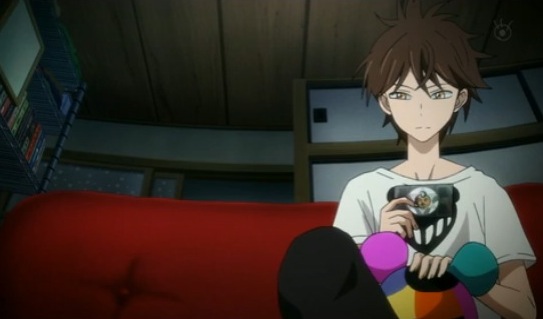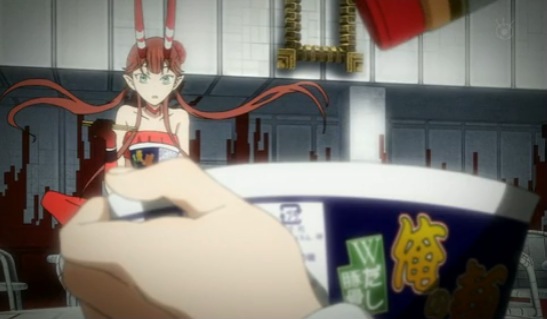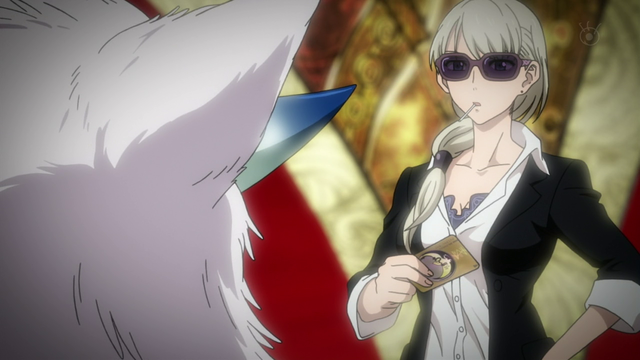I have wanted to talk about this series here for months
How much of the future are you willing to risk for the sake of the present? If you're a government, the answer is "a lot." Build up a deficit today, and maybe you'll be in good enough shape tomorrow to pay it off. After all, there's a problem now, and the future is such a nebulous thing.
It's this conflict between short-term and long-term thought that is the heart of [C] - Control: the Money of Soul and Possibility, a new 11-episode anime directed by Nakamura Kenji (the man who brought you this show) that just finished airing.
[C] is set in a Japan that is supposedly recovering from an economic crisis but in which many people are still struggling and the crime rate is high (this may see vaguely familiar). But it's also set in a connected, bizarre dimension called the "Financial District," a place that arises when people desire wealth. Certain people are offered a loan from the Midas Bank with their futures as collateral, and if they accept (and the bank is very good at getting you to accept) they are allowed into the Financial District, where they use the "assets" that represent their futures in fights that are called "deals." If you win, you gain Midas money, which can be used like real money in the real world. If you loose, you loose not only money, but some of your future. As this is a Nakamura work, the premise is taken full advantage of for trippy visuals, gradually increasing horror, and jump cuts. The whole thing is on a little acid.

Our hero is Kimimaro, an orphan and college student studying economics who can still have everything explained to him (and the viewer) explained to him because he spends classtime studying for the civil service exam (the public sector is all you can rely on these days). When he's not at school, he's working a job at a convenience store to get by. Kimimaro gets, well, bribed is a good word into being a part of the Financial District, where he kind of just scrapes by for a while. Kimimaro's the kind of guy who tends to overthink himself into stillness, and can be easily influenced by strong personality as a result, but when he finds his own purpose he can be formidable.

Kimimaro's asset is Mysu there. Mysu's a pretty typical tsundere, but she does get some nice "what measure is a nonhuman" moments in episode 7. That's about all I have to say about her, so just enjoy the perspective in that shot.

And here we have Mikuni, who is honestly a huge part of why the series works. It's not exactly a spoiler that Mikuni eventually fills an antagonistic role, since that's depicted right in the opening, but for most of the series he's more of a well-intentioned mentor. Mikuni may be misguided, as becomes increasingly clear in the end, but he's very understandably misguided. You know where he comes from, and you find out why. And he's done good things as well as...less pleasant ones.

In a somewhat different camp, we have Jennifer. Officially speaking Jennifer is an agent of the IMF, but in practice she's pretty much just acting on her own, and acting on her own means being awesome. She is one of the quirky supporting characters involved with the Financial District, in her case she is eating almost constantly, usually sweets. Jennifer is laid back and a little more of an observer than anything else, but she's also farsighted and determined to act when it's necessary.

This is Masakaki, the face of the Financial District, the guy who makes sure you bet your future. I'm including Masakaki because not only is he a strangely colored eldritch creature that appears and disappears unexpectedly, but apparently he is actually animated with a different method than the rest of the characters. This makes his movement distinctly unnerving, which is an effect I admire. Also he is voiced by Sakurai Takahiro, who voiced Medicine Seller.
I'm not going to call [C] Nakamura's best work. I'll never fault Nakamura for playing around with style, but his choices don't always work in this series, and since the base style is more conventional he doesn't have the audacity of the look of, say, Trapeze to cover up any missteps. And I'm still annoyed at the last episode. In the fight motivations that were wonderfully implied episodes earlier are shouted out, just in case we didn't get them. We did get it before, you're just cheapening it there. Similarly cheap are the pronouncements which come from on high to explain things and moralize. The show definitely earns back points with the epilogue, though, so stay past the credits in episode 11.
And for most of the series, things are quite well-done. Kimimaro's conversation with his teacher in episode 4 is one of the most effective scenes I can think of having seen in an anime- the use of lighting, combined with little images seen on the edges of shots combined with Nakamura's trademark jump shots, is just brilliant.

And it does largely avoid being too judgemental or making unfortunate implications, something that is hard to do in a series that's so grounded in current events.
Since the shows came out in successive seasons and both feature deals with the devil as more or less the main basis of the plot, there has been some comparison with Puella Magi Madoka Magica. And I have to say, if you want an anime with a Faustian theme...go for [C]. The basis, I think, is a lot more accessible. Who doesn't think about what you'd do with a little extra money in your account? Isn't it just possible that might happen somehow? I also think the way [C] builds the consequences is more effective, and those consequence are frankly more terrifying than anything in PMMM.
I hear a lot of people are turned off by episode 1, which I admit to being confused by since I was totally enthralled. I guess it is a bit of a strange way to start? But if you see the first two episodes and aren't interested, the show's probably not for you. It is one of those series that is easier to be fascinated by than it is to love. But it is only 11 episodes, so it's not too much of a time investment, and it's all on hulu and youtube for you, so if you feel like whiling away an afternoon with economics, I'd say go for it.
It's this conflict between short-term and long-term thought that is the heart of [C] - Control: the Money of Soul and Possibility, a new 11-episode anime directed by Nakamura Kenji (the man who brought you this show) that just finished airing.
[C] is set in a Japan that is supposedly recovering from an economic crisis but in which many people are still struggling and the crime rate is high (this may see vaguely familiar). But it's also set in a connected, bizarre dimension called the "Financial District," a place that arises when people desire wealth. Certain people are offered a loan from the Midas Bank with their futures as collateral, and if they accept (and the bank is very good at getting you to accept) they are allowed into the Financial District, where they use the "assets" that represent their futures in fights that are called "deals." If you win, you gain Midas money, which can be used like real money in the real world. If you loose, you loose not only money, but some of your future. As this is a Nakamura work, the premise is taken full advantage of for trippy visuals, gradually increasing horror, and jump cuts. The whole thing is on a little acid.

Our hero is Kimimaro, an orphan and college student studying economics who can still have everything explained to him (and the viewer) explained to him because he spends classtime studying for the civil service exam (the public sector is all you can rely on these days). When he's not at school, he's working a job at a convenience store to get by. Kimimaro gets, well, bribed is a good word into being a part of the Financial District, where he kind of just scrapes by for a while. Kimimaro's the kind of guy who tends to overthink himself into stillness, and can be easily influenced by strong personality as a result, but when he finds his own purpose he can be formidable.

Kimimaro's asset is Mysu there. Mysu's a pretty typical tsundere, but she does get some nice "what measure is a nonhuman" moments in episode 7. That's about all I have to say about her, so just enjoy the perspective in that shot.

And here we have Mikuni, who is honestly a huge part of why the series works. It's not exactly a spoiler that Mikuni eventually fills an antagonistic role, since that's depicted right in the opening, but for most of the series he's more of a well-intentioned mentor. Mikuni may be misguided, as becomes increasingly clear in the end, but he's very understandably misguided. You know where he comes from, and you find out why. And he's done good things as well as...less pleasant ones.

In a somewhat different camp, we have Jennifer. Officially speaking Jennifer is an agent of the IMF, but in practice she's pretty much just acting on her own, and acting on her own means being awesome. She is one of the quirky supporting characters involved with the Financial District, in her case she is eating almost constantly, usually sweets. Jennifer is laid back and a little more of an observer than anything else, but she's also farsighted and determined to act when it's necessary.

This is Masakaki, the face of the Financial District, the guy who makes sure you bet your future. I'm including Masakaki because not only is he a strangely colored eldritch creature that appears and disappears unexpectedly, but apparently he is actually animated with a different method than the rest of the characters. This makes his movement distinctly unnerving, which is an effect I admire. Also he is voiced by Sakurai Takahiro, who voiced Medicine Seller.
I'm not going to call [C] Nakamura's best work. I'll never fault Nakamura for playing around with style, but his choices don't always work in this series, and since the base style is more conventional he doesn't have the audacity of the look of, say, Trapeze to cover up any missteps. And I'm still annoyed at the last episode. In the fight motivations that were wonderfully implied episodes earlier are shouted out, just in case we didn't get them. We did get it before, you're just cheapening it there. Similarly cheap are the pronouncements which come from on high to explain things and moralize. The show definitely earns back points with the epilogue, though, so stay past the credits in episode 11.
And for most of the series, things are quite well-done. Kimimaro's conversation with his teacher in episode 4 is one of the most effective scenes I can think of having seen in an anime- the use of lighting, combined with little images seen on the edges of shots combined with Nakamura's trademark jump shots, is just brilliant.

And it does largely avoid being too judgemental or making unfortunate implications, something that is hard to do in a series that's so grounded in current events.
Since the shows came out in successive seasons and both feature deals with the devil as more or less the main basis of the plot, there has been some comparison with Puella Magi Madoka Magica. And I have to say, if you want an anime with a Faustian theme...go for [C]. The basis, I think, is a lot more accessible. Who doesn't think about what you'd do with a little extra money in your account? Isn't it just possible that might happen somehow? I also think the way [C] builds the consequences is more effective, and those consequence are frankly more terrifying than anything in PMMM.
I hear a lot of people are turned off by episode 1, which I admit to being confused by since I was totally enthralled. I guess it is a bit of a strange way to start? But if you see the first two episodes and aren't interested, the show's probably not for you. It is one of those series that is easier to be fascinated by than it is to love. But it is only 11 episodes, so it's not too much of a time investment, and it's all on hulu and youtube for you, so if you feel like whiling away an afternoon with economics, I'd say go for it.